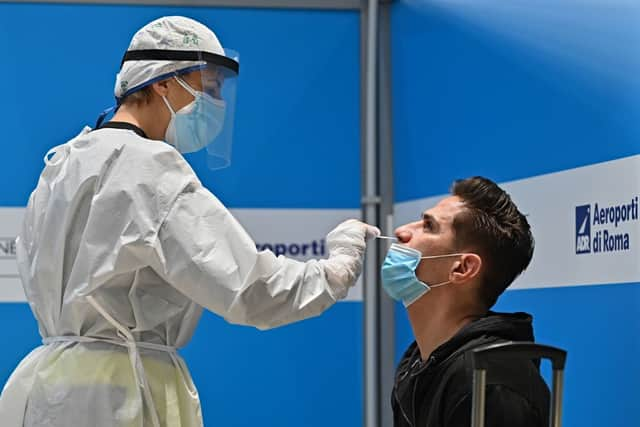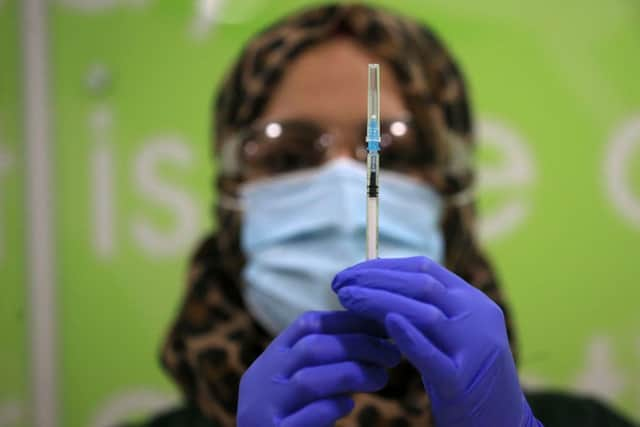What is ‘flurona’? Term explained, is it a Covid variant, is it in the UK - and what are the symptoms?
and live on Freeview channel 276
After doctors in Israel released reports of a patient who had tested positive for “flurona”, a double infection of Covid-19 and the flu, other reports of similar cases around the world have begun to surface.
This is everything we know so far.
What is ‘flurona’?
Flurona is the term that’s being used to describe a case of coinfection of Covid-19 and the flu, where one person is suffering from coronavirus and the flu at the same time. Flurona is not a new Covid-19 variant, nor is it a new disease.
Advertisement
Hide AdAdvertisement
Hide AdThe woman who was reportedly admitted to hospital in Israel with the mixture of the two viruses was pregnant and unvaccinated.
Speaking to local news outlet Hamodia at the time, Professor Arnon Vizhnitser, director of the Beilinson Hospital Gynaecology Department, said: “She was diagnosed with the flu and coronavirus as soon as she arrived.
“Both tests came back positive, even after we checked again.”


He added: “The disease is the same disease; they’re viral and cause difficulty breathing since both attack the upper respiratory tract.”
Advertisement
Hide AdAdvertisement
Hide AdThe Israeli Health Ministry is believed to be studying the results to figure out whether the combination of the two infections simultaneously can cause a more serious illness.
Professor Viznitser said: “Last year, we did not witness flu cases among pregnant or birthing women. Today, we are seeing cases of both coronavirus and the flu that are starting to rear their head.
“We are seeing more and more pregnant women with the flu. It is definitely a great challenge dealing with a woman who comes in with a fever at childbirth.
“This is especially when you do not know if it’s coronavirus or the flu, so you refer to them the same. Most of the illness is respiratory.”
How many cases have there been?
Advertisement
Hide AdAdvertisement
Hide AdWhen the reports of the woman in Israel surfaced on 1 January, it was believed at the time that it was the first recorded case of flurona - however, since then, other cases of the double infection have been discovered, with some going back as far as February 2020.
An article from The Atlantic reported that in late February 2020, only a few weeks after the Covid-19 pandemic had been given a formal name, a man with a fever and a cough showed up at an urgent care centre in Queens, New York.


At that point, according to the report, no cases of Covid-19 had yet been confirmed in the city. Tests initially came back positive for influenza, however medical staff decided to pursue further tests.
In early March, the results for Covid-19 came back positive. It turned out that the man, his wife and their two children were all positive for Covid-19 and the flu, at the same time.
Advertisement
Hide AdAdvertisement
Hide AdOutside of Israel, other reported cases of flurona include locations like the United States, Brazil, the Philippines and Hungary.
Are there ‘flurona’ cases in the UK?
While the term flurona is new, and more attention is now being paid to cases of double infection, concurrent Covid-19 and flu cases themselves are not new either.
According to data from the UK Health Security Agency (UKHSA), as reported by the Mail Online, more than 160 cases of flurona were identified in England prior to the Omicron variant wave of Covid-19.
The data shows that of the 8.6 million people in England who tested positive for Covid by the end of November last year, 169 also had the flu.
Advertisement
Hide AdAdvertisement
Hide AdIt’s hard to say how many overall cases of flurona there have been as many diagnosed with Covid-19 were not also tested for the flu because those tests are not as commonly available.


Speaking to the news outlet, Dr Simon Clarke, a microbiologist based at Reading University, said that the current risk of coinfection is “not currently high” due to the “fairly low” levels of flu cases circulating in the UK.
He added, however: “Contracting both viruses simultaneously increases the risk of being seriously ill, but risks can be mitigated by getting vaccinated and boosted against both diseases.”
The microbiologist also said that he would “be surprised if the current number of flu and Covid co-infections was below a thousand”.
Advertisement
Hide AdAdvertisement
Hide AdThe World Health Organisation says that the “most effective way to prevent hospitalisation and severe Covid-19 and influenza is vaccination with both vaccines”.
What are the symptoms?
Common signs of the flu and Covid-19 are similar, and include symptoms like a cough, runny nose, sore throat, fever, headache and fatigue.
The World Health Organisation advises that you can avoid both the flu and Covid-19 by using the same protective measures, such as maintaining social distancing, wearing a face covering, avoiding crowds and poorly ventilated areas, washing hands frequently and avoiding touching your eyes, nose and mouth.
How do I get a flu jab in the UK?
As well as booster vaccines, a flu jab programme has rolled out across the UK in a bid to get as many people protected against the flu.
Advertisement
Hide AdAdvertisement
Hide AdMinisters have said this year is set to be the UK’s largest flu vaccination programme in history.
A free flu vaccine is available to those who:
- Are 50 and over
- Have certain health conditions
- Are pregnant
- Are in long-stay residential care
- Receive a carer’s allowance, or are the main carer for an older or disable person who may be at risk if you get sick
- Frontline health or social care workers
Jabs are also being offered to all children in primary school and all children in school years seven to 11 in secondary school, children aged two and three, unpaid carers, and close contacts of immunocompromised individuals.


The flu vaccine is offered for free on the NHS to those with a serious long-term health condition, including:
- Respiratory conditions, like asthma (needing steroid inhaler or tablets), chronic obstructive pulmonary disease (COPD), including emphysema and bronchitis
- Diabetes
- Heart conditions, such as coronary heart disease or heart failure
- Being very overweight - a body mass index (BMI) of 40 or above
- Chronic kidney disease
- Liver disease, such as hepatitis
- Neurological conditions, such as Parkinson’s disease, motor neurone disease, multiple sclerosis (MS), or cerebral palsy
- A learning disability
- Problems with your spleen, for example, sickle cell disease, or if you have had your spleen removed
- A weakened immune system as the result of conditions such as HIV and AIDS, or taking medicines such as steroid tablets or chemotherapy
You can have the NHS flu vaccine at your GP surgery, a pharmacy offering the service or your midwifery service if you’re pregnant.
Advertisement
Hide AdAdvertisement
Hide AdTo book your free NHS flu jab, you can phone your doctor’s surgery to be booked in for an appointment. Those who are eligible for a free jab may also receive a letter or a phone call to remind them to book an appointment.
Alternatively, you can book your flu jab at your local pharmacy or some may offer walk-in appointments.
If you are not eligible for a free flu jab, you can purchase a vaccination privately. Boots, Tesco and Lloyds Pharmacy are some of the places offering the flu jab.
Depending on where you go, the flu vaccine can cost up to £20.
